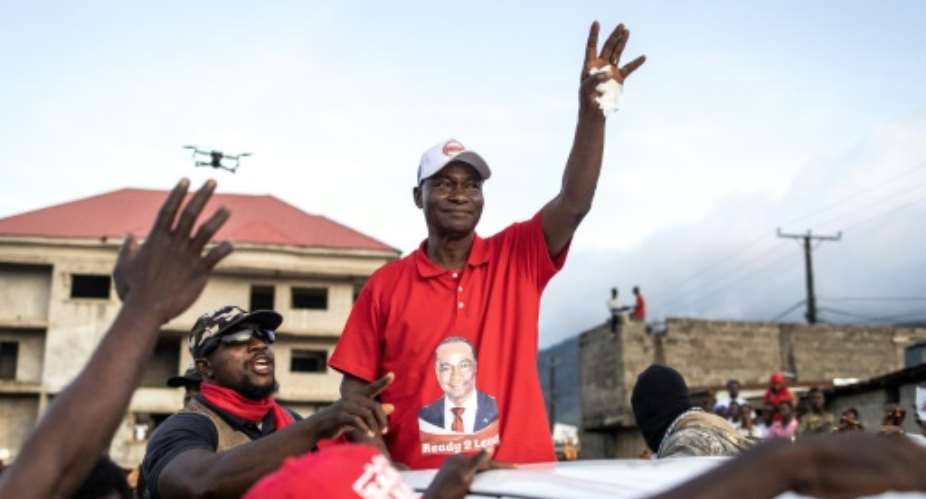Sierra Leone's main opposition party has struck a deal to end its boycott of government in exchange for the release of political detainees and an end to politically motivated legal cases.
The two sides on Wednesday evening concluded talks mediated by the Commonwealth, the African Union and the regional bloc ECOWAS following tense elections in June, which the opposition All People's Congress (APC) party disputed.
In the aftermath of the presidential, parliamentary and municipal elections, the party refused to participate in any level of government.
President Julius Maada Bio will make a national address on unity and cohesion, according to the agreement signed Wednesday evening by his chief minister David Sengeh and APC leader Samura Kamara.
Kamara is currently on trial accused of embezzling public funds while he was foreign minister, a case he has told AFP is politically motivated.
During the three-day dialogue, the two sides also agreed to set up a cross-party committee to review the June election together with development partners.
They also committed to help resettle any party supporters internally or externally displaced by political intimidation or violence.
Bio was re-elected for a second term in the first round of voting on June 24, with 56.17 percent of the ballots, according to results released by the electoral commission -- just above the 55 percent threshold needed to avoid a run-off.
'Mathematical improbabilities'
But international observers condemned a "lack of transparency" in the ballot count following the vote.
A national observation group noted significant discrepancies between voter results for presidential, parliamentary and local council elections.
In its final report, released last week, the European Union's observation mission highlighted "statistical inconsistencies and mathematical improbabilities", intimidation and political violence.
It recommended a string of measures to boost transparency, safety and freedom of expression in future elections.
At the state opening of parliament in early August, Bio called for "unity" and "dialogue", admitting to "logistical limitations" during the general elections.
 President Bio is due to give a national address on unity, cohesion and peace. By OLIVIER DOULIERY (AFP)
President Bio is due to give a national address on unity, cohesion and peace. By OLIVIER DOULIERY (AFP)
He said a committee comprising members of civil society and development partners would be set up to review the vote.
The opposition boycotted the opening.
Then-US ambassador David Reimer in mid-August said Washington would review its government-to-government programmes in Sierra Leone, including a Millennium Challenge Corporation (MCC) compact grant worth hundreds of millions of dollars.
On August 31, the US State Department announced visa restrictions on people "believed to be responsible for, or complicit in, undermining democracy in Sierra Leone", including through vote rigging or intimidation of observers.
The names of those targeted were not made public, and visa decisions are confidential under US law.
In September, Bio accused the United States of pressuring him to interfere in the election count, speaking during an event in Washington.





 Ejisu by-election: EC refers alleged bribery incident to Police for investigatio...
Ejisu by-election: EC refers alleged bribery incident to Police for investigatio...
 Bright Simons writes: How SML confused Ghanaian professors
Bright Simons writes: How SML confused Ghanaian professors
 Ejisu by-election: The envelope for officials was for lunch – EC
Ejisu by-election: The envelope for officials was for lunch – EC
 Ejisu by-election: Provisional results so far
Ejisu by-election: Provisional results so far
 2024 Election: Suncity FM boss Ransford Antwi goes Independent for Sunyani East
2024 Election: Suncity FM boss Ransford Antwi goes Independent for Sunyani East
 70% of SMEs' productivity lost to power crises in Central Region
70% of SMEs' productivity lost to power crises in Central Region
 Ejisu by-election: Don’t condemn our officials, we’re probing content of envelop...
Ejisu by-election: Don’t condemn our officials, we’re probing content of envelop...
 Government's vision is to end streetism in Ghana - Bawumia
Government's vision is to end streetism in Ghana - Bawumia
 NACOC intercepts 20.5KG worth of cannabis at postal and courier centers
NACOC intercepts 20.5KG worth of cannabis at postal and courier centers
 [VIDEO]: Ghanaian man catches wife in bed with younger lover; uses to juju cause...
[VIDEO]: Ghanaian man catches wife in bed with younger lover; uses to juju cause...
